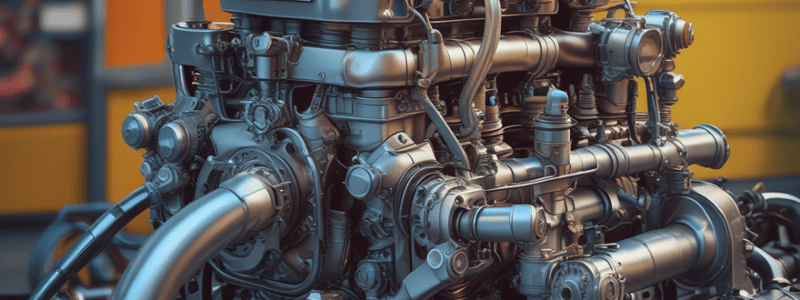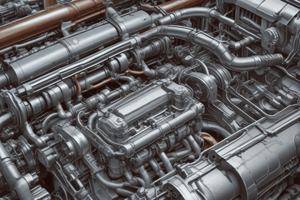Podcast
Questions and Answers
What is the primary purpose of using oil cooled pistons in some engines?
What is the primary purpose of using oil cooled pistons in some engines?
- To increase power output and reduce oil contamination
- To transfer heat from the pistons to the oil (correct)
- To act as a sealant between the piston rings and cylinder liner walls
- To prevent metal-to-metal contact between bearing surfaces
Which characteristic of engine oil is most important in determining the appropriate oil to use for a specific engine application?
Which characteristic of engine oil is most important in determining the appropriate oil to use for a specific engine application?
- Viscosity (correct)
- Additive package
- Detergency
- Lubricity
How does high viscosity oil affect engine performance compared to low viscosity oil?
How does high viscosity oil affect engine performance compared to low viscosity oil?
- High viscosity oil reduces fluid friction, improving engine performance
- High viscosity oil has no impact on engine performance
- High viscosity oil increases fluid friction, reducing engine performance (correct)
- High viscosity oil only affects performance in engines operating at high temperatures
What is the primary function of the oil film between bearing surfaces in an engine?
What is the primary function of the oil film between bearing surfaces in an engine?
Which of the following is the primary reason that engine oil must be matched to the specific engine and operating conditions?
Which of the following is the primary reason that engine oil must be matched to the specific engine and operating conditions?
What is the primary purpose of the Society of Automotive Engineers (SAE) viscosity numbering system for engine oils?
What is the primary purpose of the Society of Automotive Engineers (SAE) viscosity numbering system for engine oils?
How does low viscosity oil affect the oil film between bearing surfaces compared to high viscosity oil?
How does low viscosity oil affect the oil film between bearing surfaces compared to high viscosity oil?
What is the primary function of oil cooled pistons in some engines?
What is the primary function of oil cooled pistons in some engines?
How does the viscosity of engine oil affect engine performance?
How does the viscosity of engine oil affect engine performance?
What is the primary purpose of the oil film between bearing surfaces in an engine?
What is the primary purpose of the oil film between bearing surfaces in an engine?
Which of the following is NOT a function of engine oil?
Which of the following is NOT a function of engine oil?
What is the primary reason that engines can operate for long service intervals?
What is the primary reason that engines can operate for long service intervals?
What is the purpose of changing engine oil?
What is the purpose of changing engine oil?
According to the information provided, what is true about engine operating clearances?
According to the information provided, what is true about engine operating clearances?
What is the primary reason for the rough appearance of machined engine surfaces when viewed under a microscope?
What is the primary reason for the rough appearance of machined engine surfaces when viewed under a microscope?
Which of the following statements is true about the oil film provided by engine oil?
Which of the following statements is true about the oil film provided by engine oil?
What is the purpose of CH-4 oils?
What is the purpose of CH-4 oils?
Why are synthetic oils becoming more common according to the text?
Why are synthetic oils becoming more common according to the text?
What is a key reason for consulting engine and oil technical service representatives?
What is a key reason for consulting engine and oil technical service representatives?
Why should the vehicle work bay be isolated from other shop work bays during lube, oil, and filter service?
Why should the vehicle work bay be isolated from other shop work bays during lube, oil, and filter service?
What is a primary cause of most bearing failures mentioned in the text?
What is a primary cause of most bearing failures mentioned in the text?
Why should transfer mechanisms like hoses and funnels be kept very clean as per the text?
Why should transfer mechanisms like hoses and funnels be kept very clean as per the text?
What is one of the main reasons for containing oil spills and maintaining cleanliness in the service bay?
What is one of the main reasons for containing oil spills and maintaining cleanliness in the service bay?
Why should used oil transfer mechanisms never be used to supply new oil according to the text?
Why should used oil transfer mechanisms never be used to supply new oil according to the text?
What is the purpose of oxidation inhibitors in engine oil?
What is the purpose of oxidation inhibitors in engine oil?
Which additive helps to lower the pour point of oil?
Which additive helps to lower the pour point of oil?
What is the purpose of anti-rust agents in engine oil?
What is the purpose of anti-rust agents in engine oil?
Which API service category is meant for 2010 and older automotive engines?
Which API service category is meant for 2010 and older automotive engines?
What is the purpose of metal deactivators in engine oil?
What is the purpose of metal deactivators in engine oil?
What does the CJ-4 API service category describe?
What does the CJ-4 API service category describe?
'Film strength additives' in engine oil serve to:
'Film strength additives' in engine oil serve to:
"What is the main function of foam inhibitors in engine oil?"
"What is the main function of foam inhibitors in engine oil?"
"What do anti-rust agents help prevent when an engine is not operating?"
"What do anti-rust agents help prevent when an engine is not operating?"
What is the primary function of multi-viscosity oils like 10W/30?
What is the primary function of multi-viscosity oils like 10W/30?
What does the term 'viscosity index' refer to?
What does the term 'viscosity index' refer to?
What is the primary purpose of pour point testing?
What is the primary purpose of pour point testing?
Why are oil additives added to engine oils?
Why are oil additives added to engine oils?
What is the primary function of detergents in engine oils?
What is the primary function of detergents in engine oils?
What is the primary role of dispersants in engine oils?
What is the primary role of dispersants in engine oils?
What can happen if piston rings become stuck in the pistons?
What can happen if piston rings become stuck in the pistons?
How do detergents and dispersants work together to keep the engine clean?
How do detergents and dispersants work together to keep the engine clean?
What factor must be considered when selecting engine oils for an engine?
What factor must be considered when selecting engine oils for an engine?
What can happen if unburned fuel enters the oil as a byproduct of combustion?
What can happen if unburned fuel enters the oil as a byproduct of combustion?
Flashcards are hidden until you start studying
Study Notes
Engine Oil Characteristics
- Viscosity is a measure of an oil's resistance to flow, with higher viscosity oils flowing more slowly and lower viscosity oils flowing more quickly.
- Thicker oils have higher viscosity and are able to maintain an oil film between bearing surfaces, but can also increase fluid friction and reduce engine performance.
- Lower viscosity oils flow more easily and can reduce fluid friction, but may not provide an adequate oil film under high loads.
Functions of Engine Oil
- Reduces wear between moving parts by providing a consistent oil film between mating surfaces.
- Cleans the engine by carrying dirt, water, acids, and combustion by-products away from bearing surfaces.
- Absorbs heat generated within the engine.
Oil Classifications
- The American Petroleum Institute (API) classifies oils according to their performance characteristics.
- There are two main types of oil classifications: SI (spark ignition) for gasoline engines and CI (compression ignition) for diesel engines.
- API service categories include SN, SM, SL, and SJ for gasoline engines, and CJ-4 and CI-4 for diesel engines.
Oil Additives
- Oxidation inhibitors prevent the oil from absorbing excess oxygen and reduce the buildup of varnish and sludge.
- Anti-rust agents help maintain an oil film on internal engine parts when the engine is not operating, preventing rust formation.
- Viscosity index improvers reduce the rate of viscosity change with temperature changes.
- Film strength additives help maintain the oil film between bearing surfaces under severe operating conditions.
- Foam inhibitors limit the creation of air bubbles in the oil.
Storage and Handling
- The vehicle work bay used for lube, oil, and filter service should be isolated from the rest of the shop to prevent airborne contaminants from entering the engine oil system.
- The service bay environment must be kept clean, and technicians should take precautions to prevent dirt and dust contamination during service.
- Oil reservoirs should be positioned to prevent oil spills and ensure containment.
- Used oils should be collected in suitable containers and transferred to recycling containers using separate mechanisms to prevent cross-contamination.
Oil Viscosity
- Oil viscosity can change with temperature changes.
- Multi-viscosity oils, such as 5W/20, 10W/30, or 15W/40, enable a single oil to be used over a wide range of operating temperatures.
- Viscosity index (VI) refers to the rate of viscosity change with temperature changes.
- Oils with a high viscosity index (e.g. 100) are more stable and maintain their viscosity over a range of temperatures.
- Pour point is the lowest temperature at which an oil can be poured under prescribed test conditions.
Studying That Suits You
Use AI to generate personalized quizzes and flashcards to suit your learning preferences.




